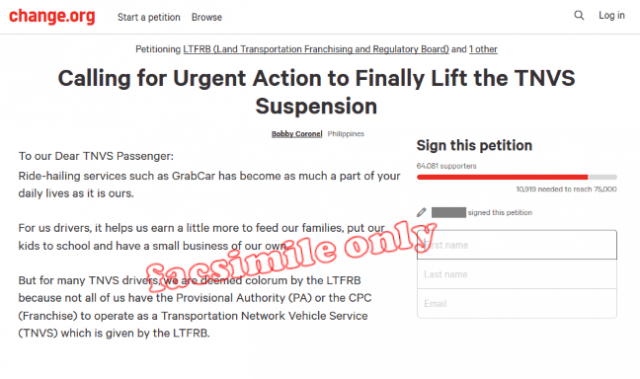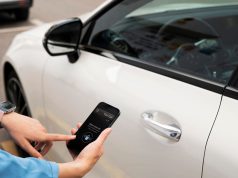The number of signatures to an online petition lodged at the internet site of Change.Org swelled to more than 60,000 by Monday evening, calling on the government not to void the operations of so-called Transport Network Vehicle Services, such as Grab and Uber Philippines.
The Land Transportation Franchising and Regulatory Board (LTFRB) intends to start its strict crackdown on so-called colorum vehicles, or those not covered by valid franchise paperwork, operating as alternative modes of taxi service to the public at large.
LTFRB had previously decided to allow the continued operation of transport network companies Uber Philippines and GRAB, but slapped a P5-million fine on each for repeated violations incurred since the government allowed their operation two years ago.
Among the violations cited in a marathon hearing by the regulator Tuesday (July 11), were the absence of proper screening procedures for drivers; transfer of accreditation from one applicant to another; and allowing those without provisional authorities or certificates of public convenience to go online.
GRAB admitted that of the 28,000 registered partners, only 4,000 have provisional authorities or certificates of public convenience.
Uber, on the hand, has more than 10,000 partners but only has more than 600 drivers with proper documentation.
Bobby Coronel, a petitioner, explained: “Our petition pertains to our partner operators and drivers with pending on still-in-process applications for Provisional Authorities. This is a plea to LTFRB to make it possible for us to operate in the meantime.”
The petitioners can’t see any possibility for such a huge volume of paperwork to be completed by July 25, as LTFRB intends to start apprehending on July 26 TNVS cars operating without having been completely processed.
Those caught by LTFRB stand to face penalties of up to PhP120,000 and risk having their vehicles impounded.
“The thing that hurts is branding us as colorum when we are trying our best to comply,” said Coronel.
A lot of the petitioners belong to the riding sector, the passengers, who see themselves likewise becoming inconvenienced if much of the TNVS cars get grounded.
They have grown used to using the TNVS services as an alternative to the grossly inefficient public transportation system in Metropolitan Manila.
Atty. Aileen Lizada, a member of the board of LTFRB, reasoned: “The proliferation of the colorum TNVS vehicles is due to the Transport Network Companies’ failure to strictly comply with the terms and conditions of their respective accreditations. The Board is simply cleaning the mess that the TNCs created.
“The Board gave both TNCs the opportunity to comply to show their good faith. In the event that they refuse or fail to comply, then enforcement is in order.
“The Board will not be influenced nor succumb to pressure. The paramount concern is compliance to ensure safety.”
Said Brian Cu, Grab Country Manager, “We earnestly hope that we can find a middle ground with the government and all the stakeholders, and come up with stronger policies to bolster the transportation sector and to provide quality service the commuters rightfully deserve.”
Click and watch this video clip below:










